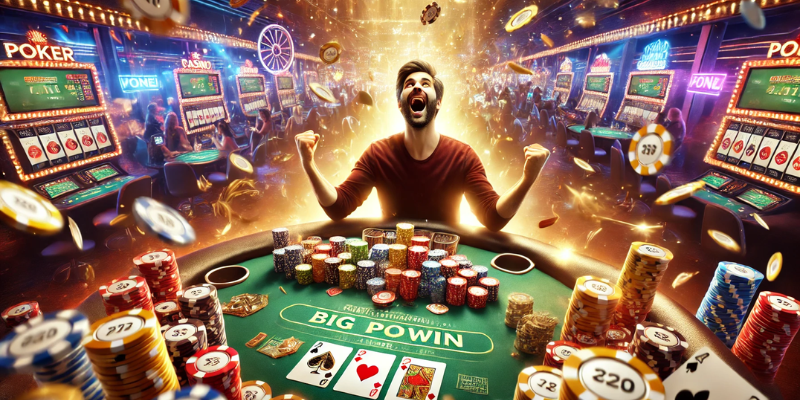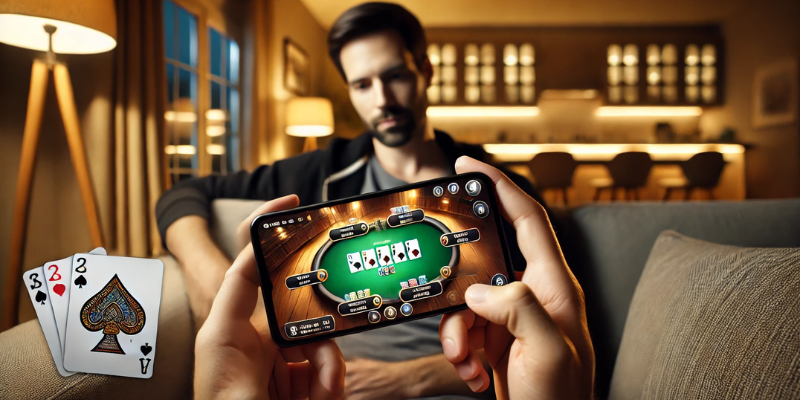Evolution of Poker From Human Mastery to AI Intervention
As an experienced casino player in the Philippines, I’ve witnessed the evolution of poker firsthand. From crowded tables in smoky backrooms to the glitzy lights of modern casinos, poker has always been a game of wit, intuition, and strategy. But something is changing, and it’s not just the skill of human players. Artificial Intelligence (AI) is reshaping the way poker is played, especially in the live poker scene. This evolution isn’t just about machines learning the game—it’s about how they’re changing the way humans play.
A Historical Perspective on Poker’s Evolution
Poker’s roots can be traced back centuries, but it truly gained its modern identity in the 19th century. Back then, it was all about human skill—reading your opponent, perfecting your bluff, and calculating odds mentally. The Philippines embraced poker in the late 20th century, and it quickly became a popular game among locals and tourists alike. The allure of live poker has always been the battle of minds at the table, where human intuition was king.
Early Days: The Golden Era of Human Skill
In the early days of live poker tournaments, especially in the Philippines, players honed their skills by observing each other’s tells, facial expressions, and betting patterns. The game required not only a deep understanding of probabilities but also a mastery of human behavior. Successful players like myself thrived by balancing mathematics and psychology.
- Face-to-face interaction was crucial in determining how to approach each hand.
- Memory played a significant role, as seasoned players often remembered tendencies and styles from past games.
- Risk management was as much an art as a science, with players developing personal strategies based on their experience.
Live poker, in its original form, was a test of human skill against other humans. For a long time, this was how the game stayed—until the digital age began to change everything.
The Rise of Online Poker: The First Disruption
When online poker exploded in the early 2000s, it changed the game forever. In the Philippines, we saw a massive shift from in-person games to online platforms. I was skeptical at first, but soon realized that playing online added new dimensions to the game.
Key Changes Introduced by Online Poker:
- Lack of physical tells: Since we couldn’t see our opponents, traditional methods of reading body language became useless.
- Faster gameplay: Online platforms offered the ability to play multiple hands in a fraction of the time.
- Data-driven decisions: Players began using poker tracking software to analyze past hands, generating more data than ever before.
The online poker boom was just the beginning. What started with simple software soon gave rise to something more powerful: AI-driven poker tools.
 The Emergence of AI in Live Poker
The Emergence of AI in Live Poker
The introduction of AI in poker came quietly, with early versions being nothing more than basic tools. However, as machine learning advanced, so did the capabilities of these AI systems. What used to be simple poker bots, easy to outsmart with human intuition, are now incredibly sophisticated AI systems capable of beating even the best players.
In live poker, AI has not just leveled the playing field—it has tilted it. Players who use AI tools for training or strategy analysis gain insights that were impossible before.
AI-Powered Poker Tools:
- Game simulators: AI-driven simulators allow players to practice hands in a variety of real-world scenarios. They simulate opponents’ behaviors, making them a valuable training resource.
- Real-time data analysis: AI can process vast amounts of data, helping players predict outcomes and odds with unprecedented accuracy.
- Predictive algorithms: AI doesn’t just calculate the best odds for a hand; it predicts opponents’ likely moves based on historical data.
These tools help players develop new strategies, transforming how we approach the game. As a Filipino poker professional, I’ve seen younger players using these AI-driven insights to up their game. It’s no longer about raw experience alone.
How AI is Shaping the Future of Live Poker Competitions
The introduction of AI into live poker has had profound effects on both casual and professional players. While some may argue that it removes the “human” aspect from the game, others see it as a new challenge. In live poker tournaments across the Philippines, players are constantly adapting to AI-driven strategies.
AI’s Impact on Strategy Development:
- Refined bluffing techniques: Players are no longer relying solely on psychological tactics. Instead, they’re using AI tools to calculate when to bluff more effectively, based on precise statistical models.
- Optimal betting strategies: AI’s ability to analyze past games allows players to refine their betting patterns, leading to more efficient risk management.
- Enhanced decision-making: AI can guide players on whether to fold, raise, or call, considering a wider range of factors than the human brain can process in a short time.
In live poker tournaments, especially in high-stakes games, AI has become an essential tool for those who want to compete at the highest level. As a result, the traditional poker scene in the Philippines has had to adapt quickly.
AI and Live Poker in the Philippines: A New Era of Competition
Here in the Philippines, the poker community is known for its strong sense of camaraderie and competition. But AI is changing that dynamic. It’s no longer just about who can read their opponent better; it’s about who can use technology to gain a strategic edge.
Adapting to AI in Live Poker:
- Younger players are more likely to embrace AI, using it as a tool to improve their gameplay.
- Older, more experienced players may struggle with the transition, as traditional strategies are often less effective against AI-informed opponents.
- Tournaments are becoming more data-driven, with AI tools analyzing live games and influencing decisions in real-time.
The shift isn’t just happening online. In live tournaments, the influence of AI is undeniable. It’s pushing players to evolve, blending human intuition with machine precision. While some might see this as losing the “soul” of the game, I see it as an exciting new challenge.
The Psychological Impact of AI on Human Players
As AI becomes more integrated into poker, it’s not just the strategies that are changing. The psychological aspect of the game is evolving too. Traditionally, poker was as much about outsmarting your opponent as it was about playing the right hand. But AI’s introduction has made that dynamic more complex.
Psychological Shifts in the Live Poker Arena:
- Increased pressure on human players: Knowing that an opponent might be using AI-driven insights can lead to heightened stress and decision-making fatigue.
- Shift in psychological warfare: Traditional methods of reading opponents through tells and behavior are becoming less reliable, forcing players to rethink their mental approach to the game.
- Blurring of the line between human and machine: As AI continues to influence strategy, the game feels less like a battle of minds and more like a battle of algorithms.
Despite these challenges, many Filipino players are embracing the change, seeing it as an opportunity to refine their skills and push their limits.
AI’s Role in Shaping the Future of Poker Strategy
Looking ahead, it’s clear that AI will continue to play a dominant role in live poker strategy. For professional players like myself, this means constantly evolving, learning to integrate AI insights while maintaining the human element that makes poker unique.
Key Future Trends in AI-Enhanced Poker Strategy:
- AI-driven training: Advanced AI training systems will become more accessible, allowing more players to sharpen their skills without the need for face-to-face competition.
- Live analysis during tournaments: AI tools will increasingly provide real-time analysis, giving players on-the-spot advice during live games.
- Hybrid strategies: The future of poker may lie in a hybrid approach, where human intuition and AI algorithms work together, creating a new kind of poker play.
As a professional, I’m both excited and cautious about the rise of AI in live poker. On one hand, it raises the competitive standard, pushing everyone to improve. On the other, it risks overshadowing the human aspect that made poker such a compelling game in the first place.
 How AI Technology is Revolutionizing Live Poker Strategies
How AI Technology is Revolutionizing Live Poker Strategies
As a seasoned casino player in the Philippines, I’ve watched the landscape of poker change dramatically over the years. One of the most transformative forces has been the integration of AI technology into live poker strategies. From cutting-edge algorithms to advanced machine learning systems, AI is reshaping how players—both locally and globally—approach the game. Gone are the days when poker was solely a battle of human intuition. Now, data-driven insights powered by artificial intelligence are raising the stakes in unprecedented ways.
Before discussing how AI is revolutionizing poker strategies, it’s essential to understand how these technologies work. AI, especially machine learning, analyzes massive amounts of data to detect patterns, optimize decision-making, and make predictions based on previous outcomes. These systems rely on algorithms that continuously learn from every poker hand played, evolving their understanding and enhancing their predictive accuracy.
Key AI Concepts in Poker:
- Machine learning: AI systems learn from the data of played poker hands, refining strategy and improving decision-making over time.
- Neural networks: AI models inspired by the human brain, enabling systems to recognize complex patterns in poker hands and opponents’ playstyles.
- Deep learning: A subset of machine learning that focuses on more intricate pattern recognition, crucial in predicting opponents’ moves based on minimal data.
In poker, AI learns to calculate the best move given specific situations, considering every variable imaginable—something that human players struggle to do at such a rapid pace.
AI’s Ability to Analyze Massive Data Sets
One of the most significant advantages of AI over human players is its ability to process and analyze enormous datasets. AI algorithms have access to thousands, if not millions, of poker hands, allowing them to detect patterns in player behavior that no human could ever spot.
For example, in a local Filipino poker tournament, AI could analyze how often certain players bluff when they have weak hands. By compiling and analyzing vast amounts of historical data, AI can fine-tune strategies that are nearly unbeatable.
How AI Utilizes Big Data in Poker:
- Player profiling: AI creates in-depth profiles of opponents by analyzing their betting habits, decision-making tendencies, and even their timing on moves.
- Optimal betting patterns: Based on historical data, AI systems can develop more efficient betting strategies, maximizing potential returns.
- Game simulation: AI can simulate countless game scenarios to predict the best moves, giving players the advantage of preparing for any situation.
Solving Poker’s Imperfect Information Problem
One of the core challenges in poker is its nature as a game of imperfect information. Unlike games like chess where all pieces are visible, poker players must make decisions based on incomplete knowledge. AI technology, however, has proven to be remarkably effective at dealing with this uncertainty.
Case Study: Libratus Poker AI In 2017, Libratus, an AI developed at Carnegie Mellon University, famously beat several world-class poker players in no-limit Texas Hold’em. The AI’s strength came from its ability to excel in imperfect information scenarios, calculating probabilities and potential outcomes faster than any human could. It adjusted its strategy mid-game based on the behavior of its opponents, proving that AI can successfully bridge the gap between known and unknown information.
How AI Enhances Bluffing Strategies
Bluffing has always been an integral part of poker. But AI has taken this psychological tactic to a new level. In many Filipino poker tournaments, I’ve noticed how AI-informed players are bluffing more precisely, using AI’s advanced calculations to back their decisions.
AI’s Approach to Bluffing:
- Strategic randomness: AI understands that bluffing cannot be predictable. It analyzes the probability of success and incorporates a certain degree of randomness, making it harder for opponents to read.
- Adaptive bluffing: AI can adjust its bluffing frequency based on the opponent’s style. For example, if it notices that a particular player rarely calls high bets, it will bluff more often.
- Mathematical precision: Unlike humans, who rely on gut feelings, AI uses cold hard numbers to determine when bluffing is optimal, ensuring that it occurs only in situations where the risk-to-reward ratio is favorable.
AI in Real-Time Decision Making: A Game-Changer
AI’s greatest strength is in real-time decision-making. While human players may take time to process what’s happening in a game, AI can analyze data and make calculated moves in a matter of milliseconds.
In live poker tournaments in the Philippines, we’ve started seeing AI-assisted tools that help players make decisions in real-time. These tools track player actions, compare them to massive datasets of past games, and recommend the best course of action for any given hand.
Real-Time AI Tools for Live Poker:
- Heads-up displays (HUDs): These display real-time statistics about the current game, providing players with instant information about their opponents’ tendencies.
- Decision-support algorithms: These are more advanced AI systems that suggest the best move based on the current game state, the player’s hand, and the opponents’ likely strategies.
In the Philippines, many poker enthusiasts are beginning to rely on these tools to stay competitive in tournaments. While some view them as unfair, others see them as a natural progression of the game.
How AI is Revolutionizing Defensive Play
Historically, defensive play in poker relied heavily on intuition and the ability to read opponents. But AI has completely changed the landscape of defensive poker strategy. AI doesn’t just focus on the best offensive plays but also provides insights into when players should fold or take a cautious approach.
AI-Driven Defensive Strategies:
- Opponent modeling: AI identifies when an opponent is likely bluffing or betting strongly. This allows players to avoid aggressive bets when it’s clear they are beaten.
- Fold optimization: AI calculates the exact moments when folding is the most optimal move, protecting players from unnecessary losses.
- Exploitative defense: If AI detects that an opponent is making consistent mistakes, it adjusts its strategy to take advantage while minimizing the player’s exposure to risk.
In several Filipino tournaments I’ve played in, I’ve seen defensive AI-driven strategies protect players from major losses, shifting the game from an aggressive offense to a more calculated defense.
 Live Poker Adapting AI Strategies in Live Filipino Tournaments
Live Poker Adapting AI Strategies in Live Filipino Tournaments
While AI has dominated online poker games, its presence is also being felt in live tournaments. Here in the Philippines, the integration of AI into live poker has been slow but steady. Many Filipino players, especially younger ones, have started using AI tools to train and adapt their strategies for local tournaments.
AI’s Influence in Filipino Poker Tournaments:
- Pre-game preparation: Many Filipino players are now using AI tools like poker solvers to analyze hand histories and prepare strategies before tournaments begin.
- Post-game analysis: AI allows players to review their hands after a game, breaking down every decision made and providing suggestions for improvement.
- Live tournament strategies: During live tournaments, players are increasingly leveraging AI-based insights gained from online simulations, adapting them to the fast-paced live environment.
One memorable example was in a recent tournament I attended at a casino in Manila, where a young player used an AI-based strategy to consistently win pots by calculating the exact statistical advantage he had over the field. His systematic approach was unlike anything we had seen before.
AI’s Role in Multitabling and Volume Play
One of the most significant impacts AI has had on poker is in multitabling and volume play. While humans struggle to maintain focus across multiple tables, AI thrives. For online poker, players using AI systems can engage in numerous games simultaneously without sacrificing performance.
In live settings, this has translated into AI helping players become more efficient in time management and decision-making. Some players are now able to handle far more action during tournaments, processing their moves faster and with greater precision.
Key Advantages of AI in Multitabling:
- Enhanced focus: AI helps players manage multiple tables or hands without the usual cognitive overload.
- Minimized errors: AI reduces the chance of mistakes during fast-paced, high-volume games.
- Increased profitability: With AI’s assistance, players can focus on higher-return strategies across a broader set of games.
 Ethical Considerations in AI-Driven Live Poker
Ethical Considerations in AI-Driven Live Poker
As AI becomes more prevalent in poker, ethical questions are also being raised. Many traditional players argue that the use of AI in live poker tournaments gives certain players an unfair advantage. In response, some casinos and online platforms have implemented regulations limiting or banning the use of AI-assisted tools.
Ethical Dilemmas:
- Fair competition: Does AI give some players an unfair edge, especially in live tournaments?
- Skill versus technology: Can AI-assisted play still be considered skill-based, or is it more about who has access to better technology?
- Regulatory challenges: How can casinos in the Philippines and abroad enforce rules on AI in a live poker setting?
It’s a controversial topic, but one thing is clear: AI is here to stay, and players and organizers will need to adapt to this new reality.
Comparing AI-Driven Poker Engines vs Human Intuition: A Battle for Poker Supremacy
As an experienced casino player in the Philippines, I’ve spent countless hours at the poker table, observing how players rely on their instincts, read opponents, and make split-second decisions. However, poker today isn’t just about gut feelings or sharp wits similar to SA Gaming. The rise of AI-driven poker engines has introduced a new era of competition where algorithms can analyze millions of hands and make decisions based on vast data. This clash between AI-driven systems and human intuition has reshaped how live poker is played, especially in high-stakes tournaments.
To fully appreciate the impact of Live Poker AI, it’s essential to first understand what each side of the equation offers.
- AI-driven poker engines rely on mathematical algorithms, data analysis, and probability calculations. They make decisions based on patterns, odds, and past data. AI doesn’t second-guess itself.
- Human intuition, on the other hand, is based on experience, reading body language, psychological manipulation, and instinct. It can be unpredictable and adaptable, factors that AI struggles to replicate.
Point-by-Point Comparison:
- Processing Power:
- AI: Processes vast amounts of information quickly, never fatigued by the game’s length.
- Human: Relies on experience but can suffer from decision fatigue or emotional swings.
- Memory:
- AI: Remembers every hand played, every variable, and every outcome.
- Human: Human memory is selective and can be clouded by emotions, though experience often sharpens key instincts.
- Emotional Stability:
- AI: Emotionless; always makes the mathematically optimal play.
- Human: Prone to emotional decision-making, which can either hinder or enhance gameplay depending on the player.
The Strengths of AI-Driven Poker Engines
AI-driven poker engines have gained notoriety for beating some of the world’s best poker professionals, proving that AI has a distinct advantage in certain areas of live poker.
Strengths of AI in Live Poker:
- Consistent Performance
- AI doesn’t get tired or make impulsive decisions. It plays consistently over long sessions, never faltering due to fatigue or frustration. In contrast, human players can struggle to maintain focus during extended games, particularly in high-stakes Filipino tournaments where the pressure builds over time.
- Impeccable Mathematical Precision
- One of AI’s biggest strengths is its ability to calculate probabilities with precision. When facing a difficult decision, AI can run simulations based on historical data and come up with the best possible move, considering every known factor.
- For example, in a local poker event in Manila, I watched a player use AI-based analytics during breaks to review how the game was unfolding. They gained an edge by knowing exactly when to fold and when to push forward based on statistical calculations.
- Adaptability to Unknown Situations
- Modern AI systems, like the famous Pluribus AI, are designed to handle multi-player scenarios and adjust to unexpected strategies. Even in unfamiliar situations, AI can quickly recalibrate its approach, something humans may struggle with under pressure.
- Predictive Modeling
- AI-driven systems are excellent at predicting the actions of other players. Based on previous behavior, AI can accurately model what the most likely outcome is for each move, reducing uncertainty. In live poker, this capability is invaluable for avoiding traps and maximizing profits.
The Unique Strengths of Human Intuition
While AI has its strengths, human intuition has dominated the poker world for decades. Even with the rise of Live Poker AI, there are areas where intuition and human decision-making shine.
Strengths of Human Intuition in Poker:
- Psychological Warfare
- Poker isn’t just a game of cards; it’s a psychological battle. Experienced Filipino players like myself know how crucial it is to read an opponent’s facial expressions, posture, and timing. AI can’t interpret these subtle cues, which give humans an advantage in live settings.
- I’ve witnessed countless hands where an instinctual “read” of a player’s body language led to a pivotal fold or raise, despite what the odds suggested.
- Bluffing and Manipulation
- Human intuition thrives in situations where deception is key. Bluffing is an art that’s hard to master but can shift the entire dynamic of a game. AI, though capable of bluffing mathematically, can’t feel or understand the psychology behind a well-timed bluff. In a tournament I participated in at Resorts World Manila, a seasoned player with a weak hand pushed an AI-driven opponent into folding by controlling the psychological pace of the game.
- Adapting to Non-Data-Based Variables
- While AI relies on patterns and known data, human intuition can adjust to subtle, non-quantifiable variables like atmosphere, physical tension, and even fatigue in other players. An experienced player can sense when their opponent is rattled or tired, leveraging those moments for strategic gains.
- Creativity and Spontaneity
- Unlike AI, which is restricted by its programming, human players can make bold, creative moves that defy logic. This unpredictability can be difficult for AI systems to counter, particularly in high-stakes situations where a human player’s instincts are honed from years of experience.
Weaknesses of AI in Live Poker
Despite its many strengths, AI-driven poker engines are not without their weaknesses, especially in live tournament environments.
Limitations of AI in Poker:
- Lack of Emotional Insight
- AI may have perfect logic, but it lacks the ability to interpret emotions. In a game like poker, where psychological dynamics play a huge role, AI can miss crucial context. For example, in a local Filipino poker game, I observed a player exploit an AI-powered opponent’s predictability, using emotional cues and table talk to shift the game’s momentum.
- Limited Creativity
- AI is built to optimize based on known probabilities and outcomes. While this works well in structured environments, it can struggle against players who use unconventional tactics. Humans can introduce chaos and unpredictability into the game, something AI systems find difficult to handle.
- Over-Reliance on Data
- In environments where data is sparse or incomplete—like a live tournament where certain players don’t have a large digital footprint—AI’s performance suffers. Without a rich dataset, AI engines become less effective at predicting moves, giving the edge to human players who can operate with limited information.
Weaknesses of Human Intuition in Poker
Although human intuition has been the cornerstone of poker for years, it also comes with its limitations.
Human Weaknesses in Live Poker:
- Emotional Instability
- Unlike AI, humans are prone to emotional swings. I’ve seen players lose their composure after a bad beat, allowing frustration to cloud their judgment. Emotions can lead to impulsive decisions, which AI is immune to.
- Cognitive Fatigue
- Long live poker sessions, which are common in Filipino poker tournaments, can wear players down. As a human, it’s difficult to maintain peak performance for hours or even days. AI, on the other hand, doesn’t tire and can maintain the same level of sharpness throughout the game.
- Limited Processing Power
- No matter how skilled a player is, there’s a limit to how much information they can process in real time. AI can analyze millions of variables in seconds, while humans often need to rely on instinct when faced with complex decisions.
Real-Life Example: AI vs Human Intuition in a Filipino Tournament
In one of the more prestigious poker tournaments in Manila, I had the opportunity to observe the difference between AI-driven players and those relying solely on intuition. The AI-powered players made mathematically optimal decisions, folding or raising based on algorithmic predictions. However, as the game progressed, human players began using emotional manipulation and reading body language to bluff their way to victory.
Key Observations:
- The AI player dominated in early hands due to its strong mathematical foundation, calculating pot odds and making quick decisions.
- In the later stages, when the game became more psychological, experienced human players adjusted their strategies, taking advantage of AI’s inability to read emotions or recognize fatigue.
Can AI and Human Intuition Coexist?
As AI technology continues to evolve, the debate over whether Live Poker AI will eventually dominate the game remains. In the Philippines, where poker culture is deeply rooted in camaraderie and psychological warfare, it’s hard to imagine AI completely replacing human intuition.
However, a hybrid approach may emerge as the future of live poker. AI could be used as a training tool or even as a strategic assistant, but human intuition will always be central to the game. The best players will likely blend the strengths of both, using AI for precise calculations while relying on their instincts to handle the psychological aspects of the game.
In the clash between AI-driven poker engines and human intuition, each has its distinct advantages. While AI excels in consistency, precision, and real-time analysis, human intuition brings unpredictability, creativity, and emotional intelligence to the table. In the Philippines’ vibrant poker scene, these two forces are bound to continue influencing each other, pushing the game to new heights.
 AI in the Filipino Live Poker Scene
AI in the Filipino Live Poker Scene
As a seasoned casino player in the Philippines, I’ve seen the country’s poker landscape evolve over the years. The rise of AI technology is arguably one of the most transformative developments in recent times. Once a game that was purely reliant on human intuition and psychology, poker is now undergoing a technological revolution, with Live Poker Microtransactions beginning to play a crucial role in shaping how the game is played, taught, and even perceived in the local poker scene. The Philippines, with its burgeoning poker community, is not immune to these changes.
When AI in poker first started making waves internationally, Filipino players, like many around the world, were skeptical. The idea of relying on Live Poker AI to make decisions felt foreign to many who had spent years refining their strategies based on human psychology and intuition.
- Resistance to Change: Many traditional players felt that AI took the “soul” out of the game, seeing it as a threat to the thrill of outplaying an opponent using wit and experience.
- Concerns About Fairness: In early discussions among Filipino poker circles, the ethics of using AI tools were hotly debated. Some questioned whether AI created an unfair advantage in live tournaments, where players without access to such tools could be at a disadvantage.
However, despite this initial resistance, the tide has begun to shift. Filipino players, especially younger ones, are now embracing AI as a valuable tool for improvement.
The Growing Acceptance of AI Among Filipino Players
As AI’s capabilities became more apparent, the acceptance of AI in poker gradually spread through the Filipino poker scene. While traditionalists may still prefer to rely on instinct and experience, more and more players have started to see the benefits of integrating AI into their strategies.
Reasons for Increased Adoption:
- Competitive Edge: Players quickly realized that AI could provide insights that human intuition alone couldn’t. AI systems can analyze vast amounts of data, offering players a competitive edge in predicting odds, understanding betting patterns, and improving decision-making.
- Training Tools: Many Filipino players now use AI-powered training tools and simulators to sharpen their skills. By running countless scenarios through AI algorithms, players can practice difficult situations and develop new strategies for both live and online games.
- Access to Global Trends: With the growth of the global poker scene, Filipino players started to notice how international players were benefiting from AI, especially in high-stakes games. Adopting AI became a way to keep up with the global poker trends.
Tournament Organizers’ Response to AI in the Philippines
Tournament organizers in the Philippines have had to adapt to the growing presence of AI in poker. The introduction of AI-enhanced strategies has raised questions about the integrity of live poker events and how technology should be regulated.
Adjusting Tournament Rules:
- Banning AI-Assisted Play: Some tournaments in the Philippines have implemented strict rules that prohibit the use of AI tools during live games. This includes devices that provide real-time analysis, such as poker solvers or HUDs (Heads-Up Displays), which give players information on opponents during play.
- AI for Post-Game Analysis Only: Many organizers encourage AI use for post-game analysis but restrict its use during active games. AI can be an excellent learning tool to help players refine their strategies between rounds, but it must be kept out of live gameplay to ensure fairness.
- AI-Free Zones: A few high-stakes Filipino tournaments have introduced “AI-free” zones where no digital devices are allowed at the tables. These events focus on preserving the traditional essence of poker, where only human skill and intuition matter.
AI’s Influence on Filipino Poker Strategies
One of the most significant impacts of AI in the Filipino poker scene has been its effect on strategy development. AI’s ability to analyze large amounts of data and simulate countless scenarios has fundamentally changed how many Filipino players approach the game.
AI-Driven Strategy Adjustments:
- GTO (Game Theory Optimal) Strategies: AI has brought GTO strategies to the forefront of the Filipino poker scene. GTO focuses on making decisions that are mathematically balanced, minimizing the chance of being exploited by an opponent. Filipino players are increasingly adopting GTO principles in live tournaments, thanks to AI-driven simulations.
- Exploiting Human Weaknesses: Filipino players using AI insights are better equipped to identify and exploit their opponents’ weaknesses. AI can detect patterns in a player’s betting style and suggest optimal counter-strategies, giving those who use it a tactical advantage.
- Improving Bluffing Techniques: AI helps players develop more sophisticated bluffing techniques by providing a statistical analysis of when bluffing will be most effective. In live poker tournaments in the Philippines, bluffing has become more calculated, with players balancing risk vs reward based on AI-driven probabilities.
AI’s Role in Shaping New Generations of Filipino Players
The younger generation of Filipino poker players is the one most heavily influenced by AI. While many older players still rely on experience and tradition, younger players are much more likely to integrate Live Poker AI into their preparation and gameplay.
How Young Players Are Embracing AI:
- Tech-Savvy Players: The new generation of Filipino poker players has grown up with technology, making them more open to using AI tools. Many of these players use AI-powered simulators to practice hands, analyze strategies, and refine their game in ways that weren’t available before.
- Online Poker as a Gateway: Online poker platforms, where AI tools are more widely accepted, have become the training ground for many young Filipino players. By using AI-driven analysis to improve their online play, they’re better prepared to compete in live tournaments.
- Mentorship Through AI: AI has also become a valuable teaching tool. Players are now using AI-driven software to mentor and coach others, sharing insights and improving collective gameplay. This peer-to-peer learning, enhanced by technology, is creating a more skilled pool of players in the Philippines.
Conclusion
AI may be reshaping poker, but it can’t replicate the excitement of sitting across from a live opponent. The heart-pounding moments, the thrill of a successful bluff, and the connection between players are things that AI will never truly capture.
AI technology is revolutionizing poker strategies worldwide, and the Philippines is no exception. From advanced bluffing techniques to real-time decision-making tools, AI is transforming how we approach the game. Whether you’re a seasoned professional or a new player entering the scene, adapting to these changes is crucial.
In the Philippines, live poker will always have a place—whether AI becomes a more dominant force or not. For players like me, it’s about finding that balance. We must embrace AI’s benefits without losing the essence of what makes poker such an enduring game.
AI has brought a new dimension to poker, but at the end of the day, it’s still humans who are holding the cards.
